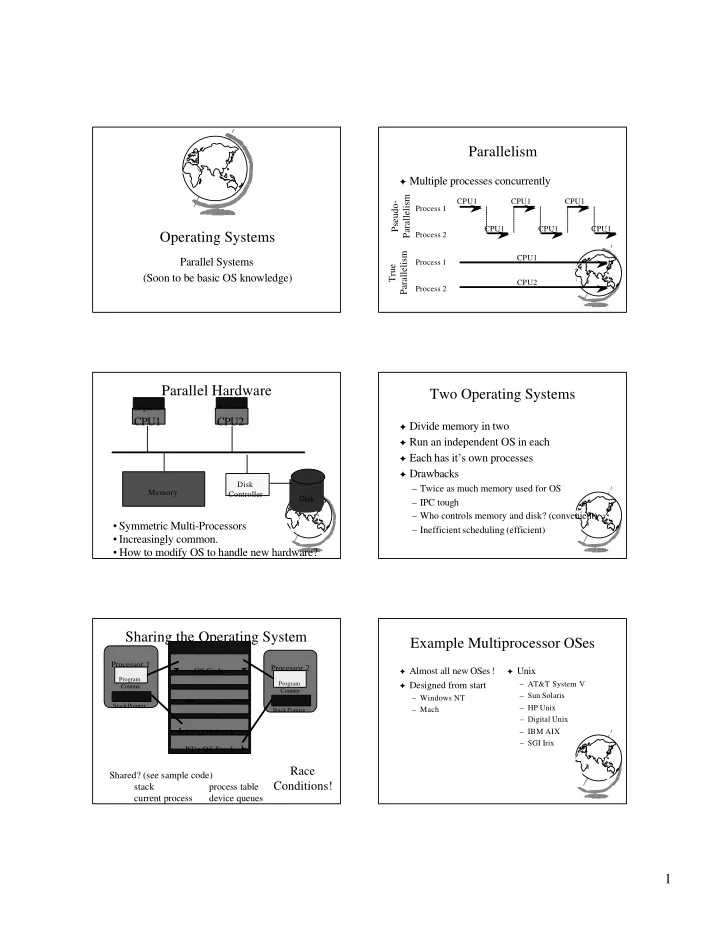

Parallelism ! Multiple processes concurrently Parallelism CPU1 CPU1 CPU1 Pseudo- Process 1 CPU1 CPU1 CPU1 Operating Systems Process 2 Parallelism CPU1 Parallel Systems Process 1 True (Soon to be basic OS knowledge) CPU2 Process 2 Parallel Hardware Two Operating Systems Registers Registers CPU1 CPU2 ! Divide memory in two ! Run an independent OS in each ! Each has it’s own processes ! Drawbacks Disk – Twice as much memory used for OS Memory Controller Disk – IPC tough – Who controls memory and disk? (convenient) • Symmetric Multi-Processors – Inefficient scheduling (efficient) • Increasingly common. • How to modify OS to handle new hardware? Sharing the Operating System Example Multiprocessor OSes Main Memory Processor 1 Processor 2 OS Code ! Almost all new OSes ! ! Unix Program – AT&T System V Program ! Designed from start Counter OS Common Data Counter – Sun Solaris – Windows NT P1’s OS Data Stack Pointer – HP Unix – Mach Stack Pointer P2’s OS Data – Digital Unix – IBM AIX P1’s OS Stack – SGI Irix P2’s OS Stack Race Shared? (see sample code) Conditions! stack process table current process device queues 1
Threads (Lightweight Processes) ! Basic unit of CPU utilization Process – (“What?!” you say) Program A B C ! Own Counter – program counter (Threads) – register set text segment Threads – stack space A stack B stack C stack ! Shares Software Multi-Processors – code section A B C – data section data segment – OS resources “Multithreaded Program” Stack Example: A Threaded Spreadsheet A(int tmp) { Recalculate Display B(); Thread Thread A: tmp = 2 printf(tmp) Spreadsheet ; Data C } B() { Other B Data C(); A: tmp = 1 } Command Thread C() { A(2); } What Kinds of Programs to Thread? Thread Benefits ! “What about just using processes with ! Independent tasks shared memory?” – ex: debugger needs gui, program, perf monitor… – fine – especially when blocking for I/O! – debugging tougher (more thread tools) ! Single program, concurrent operation – processes slower – Servers N 30 times slower to create on Solaris N ex: file server, web server N slower to destroy – OS kernels N slower to context switch among N concurrent requests by multiple users -- no protection – processes eat up memory needed in kernel N few thousand processes not ok N few thousand threads ok 2
Do they Work? Threads Standards ! POSIX (Pthreads ) ! Operating systems – Common API – Mach, Windows NT, Windows 95, Solaris, – Almost all Unix’s have thread library IRIX, AIX, OS/2, OSF/1 ! Win32 and OS/2 – Millions of (unforgiving) users ! NFS, SPECfp, SPECint – very different from POSIX, tough to port – commercial POSIX libraries for Win32 – OS/2 has POSIX option ! Solaris – started before POSIX standard – likely to be like POSIX 1 4 8 12 16 20 24 CPUs Levels of Threads User Level Thread Process A Process B Thread Kernel Thread 3
Recommend
More recommend